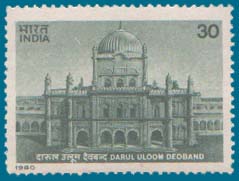
DARUL-ULOOM, DEOBAND

The 1857 War of Independence was fought with unique revolutionary fervour and sense of national identity. One of its many remarkable features was the participation of a large number of Muslim divines and thinkers who not only issued edicts in favour of the war against the British, but also often fought as combat soldiers in the nationalist army. Among those who took part in the battle of Shan-iii in Muzaffanagar District of Uttar Pradesh was the great sufi and saint, Shah lmdadullah Muhajir Makki; one of his companions in arms was a 25 years old scholar Muhammad Qasim, of Nanauta in Saharanpur District of Uttar Pradesh later to become famous all over the Islamic world as the founder and the guiding spirit of the Darul-Uloom at Deoband ( District Saharanpur)
Founded in 1866, with the inspiration of Shah lmdadullah Muhajir Makki, Maulana Rashid Ahmad Gangohi and other great Muslims of time, the Darul -Uloom began to attract students and scholars from far and wide even during the brief life span of Maulana Muhammad Qasim. The institution kept up its tradition, of unflinching devotion to the laws and learning of Islam in their pristine purity, strong nationalist bias and total independence of Government aid. It be- came, in the words of the late President Rajendra Prasad, "a stronghold of freedom". During its 114 years of existence, it has not accepted any grant or aid from any Government body and yet has been able to educate to the -highest level more than 1 5,000 scholars in Islamic laws, theology, philosophy, and medicine. Students have come to it from as far as the USSR, China, Africa, and even Saudi Arabia, Iraq and Yemen. At present its enrolment exceeds 1,800; the number of resident teachers and men of learning is almost 400; its budget for the year 1978 was about Rs. 29 lakhs. Among those who have taught or studied at the Darui-Uloom are some of the greatest names in the world of Islamic learning during the last one hundred years. The Darul-Uloom has stood over the years as a citadel of the ideals of freedom and self-determination against European imperialism all over Asia and Africa.
Maulana Muhammad Qasim died at the early age of 48 in 1880, almost a hundred years ago. The Indian P&T Department is privileged to issue a special stamp to commemorate Darul-Uloom, the institution that is his everlasting memorial.
Description of Design: The stamp depicts a view of the main building of Darul-Uloom, Deoband which houses Darul -Tafseer and Darul - Hadis.
The first day cover, designed by the India Security press, shows a view of the building of Darul-Ifta, one of the departments of Darul-Uloom, Deoband.
Date of issue: 21.3.1980